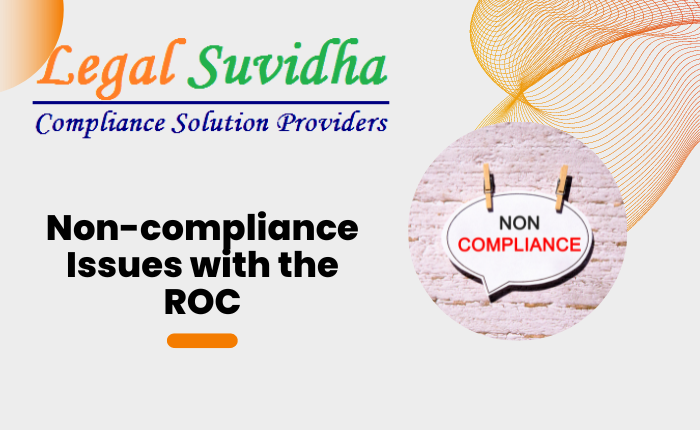In today’s dynamic business environment, compliance with regulatory requirements is of paramount importance for the smooth functioning and sustainability of businesses. One such regulatory body that plays a vital role in overseeing corporate compliance is the Registrar of Companies (ROC). However, non-compliance with the ROC can have severe repercussions for businesses, ranging from financial penalties to legal liabilities. In this blog, we will delve into the common reasons behind non-compliance with the ROC and shed light on the potential consequences that businesses may face as a result.
1. Lack of Awareness and Understanding
One of the primary reasons for non-compliance with the ROC is a lack of awareness and understanding of the regulatory requirements. Many business owners, especially those running small or medium-sized enterprises, may not be fully aware of the specific obligations imposed by the ROC. This can include failure to file necessary forms, maintain required records, or adhere to reporting deadlines. Ignorance of the law is no excuse, and failing to comply can lead to serious consequences.
Businesses must prioritize staying informed about the applicable laws and regulations that govern their industry and operations. This can be achieved through regular monitoring of updates from the ROC, engaging legal or compliance professionals, and participating in training programs or workshops that provide insights into compliance requirements. By actively seeking knowledge, businesses can reduce the risk of non-compliance due to a lack of awareness.
2. Administrative Errors and Oversights
Even well-intentioned businesses can inadvertently fall into non-compliance due to administrative errors or oversights. These errors can range from minor mistakes in filing forms to more significant issues such as incorrect information provided in statutory documents. Such errors can occur due to human error, lack of proper internal controls, or inadequate record-keeping practices.
To mitigate the risk of administrative errors leading to non-compliance, businesses should establish robust systems and processes. This can include implementing regular internal audits to identify and rectify any discrepancies, maintaining a centralized repository for important documents, and conducting thorough reviews before submitting any filings to the ROC. By prioritizing attention to detail and accuracy, businesses can minimize the chances of administrative errors resulting in non-compliance.
3. Financial Challenges and Resource Constraints
Financial challenges and resource constraints can also contribute to non-compliance with the ROC. Some businesses may struggle to allocate adequate funds and resources toward maintaining compliance due to tight budgets or competing priorities. This can lead to delayed filings, incomplete documentation, or failure to meet financial reporting requirements.
While financial constraints can be a genuine obstacle, businesses should recognize the importance of compliance as an investment rather than an expense. Allocating resources for compliance functions, such as hiring or training compliance personnel or utilizing software solutions for automated reporting, can help streamline compliance processes. Moreover, proactive financial planning and budgeting can assist in ensuring that compliance obligations are met without compromising other crucial aspects of business operations.
4. Changes in Regulatory Landscape
Regulatory frameworks are subject to constant evolution, and businesses must adapt accordingly. However, keeping up with regulatory changes can be a difficult task, especially for organizations that lack dedicated compliance departments or access to expert advice. Failure to stay informed about new laws, regulations, or reporting requirements can result in unintentional non-compliance.
To address this challenge, businesses should establish mechanisms to monitor and update their compliance practices in response to evolving regulatory landscapes. This can involve subscribing to newsletters or alerts from regulatory bodies, engaging legal or compliance professionals to provide guidance, and conducting periodic assessments of compliance procedures. By staying proactive and adaptive, businesses can stay ahead of regulatory changes and maintain compliance with the ROC.
Potential Consequences of Non-compliance
Non-compliance with the ROC can lead to a range of potential consequences for businesses. These consequences may vary depending on the severity and frequency of non-compliance, as well as the jurisdiction in which the business operates. Here are some common potential consequences:
1. Penalties and Fines
ROCs have the authority to impose penalties and fines on businesses that fail to comply with their requirements. These financial penalties can range from moderate to substantial, depending on the nature and severity of the non-compliance. In some cases, penalties may be levied on a daily basis until compliance is achieved, leading to significant financial burdens for non-compliant businesses.
2. Legal Liabilities
Non-compliance can expose businesses to legal liabilities, including lawsuits from stakeholders or regulatory bodies. For example, if a business fails to file required financial statements, it may be in breach of the law and subject to legal action. This can result in costly legal proceedings, damage to the business’s reputation, and potential financial losses. Compliance with the ROC’s requirements helps mitigate the risk of legal liabilities and promotes a culture of responsible business practices.
3. Loss of Good Standing
Non-compliant businesses may lose their good standing with the ROC, which can negatively impact their reputation and credibility. Good standing refers to the status of a business being in compliance with all relevant legal and regulatory requirements. Losing this status can lead to difficulties in securing contracts, attracting investors, or obtaining financing. Maintaining a positive reputation by complying with the ROC’s regulations is crucial for building trust with stakeholders and creating opportunities for business growth.
4. Inability to Access Government Benefits
Some government programs, incentives, or grants may require businesses to be in compliance with the ROC. Non-compliance can result in the loss of eligibility for these benefits, depriving businesses of valuable opportunities for growth and development. By maintaining compliance, businesses can ensure they have access to various government initiatives aimed at supporting business development, fostering innovation, or providing financial assistance.
Resolving Non-compliance Issues:
Resolving non-compliance issues with the ROC (Registrar of Companies) requires careful attention and proactive steps to rectify any violations and mitigate potential penalties. Here are some guidance and steps to effectively address non-compliance issues:
1. Identify the Non-Compliance: Review and understand the specific non-compliance issues with the ROC. This could include failure to file necessary documents, late filing, inaccurate information, or other violations.
2. Assess the Impact: Evaluate the potential consequences of the non-compliance, such as financial penalties, reputational damage, legal repercussions, or loss of certain privileges or benefits.
3. Seek Legal Advice: If needed, consult with legal professionals or experts who specialize in corporate compliance to get a better understanding of the legal implications and potential courses of action.
4. Develop an Action Plan: Create a comprehensive plan outlining the steps necessary to rectify the non-compliance issues. Include specific actions, responsibilities, timelines, and necessary resources to address each violation effectively.
5. Rectify the Violations: Take immediate action to rectify the non-compliance issues. This may involve filing overdue documents, correcting inaccuracies, updating information, or fulfilling any other requirements set by the ROC.
6. Maintain Updated Records: Implement systems and processes to ensure compliance going forward. Keep accurate and up-to-date records of all relevant documentation, filings, and compliance requirements to prevent future non-compliance issues.
7. Communicate with the ROC: Proactively reach out to the ROC to inform them of the steps you are taking to rectify the violations. Maintain open lines of communication to demonstrate your commitment to compliance and willingness to cooperate.
8. Cooperate Fully: If the ROC requires additional information or further action, respond promptly and provide all requested details. Cooperate fully throughout the process to show your commitment to resolving non-compliance issues.
9. Mitigate Potential Penalties: If there are potential penalties involved, try to negotiate with the ROC to reduce or mitigate the consequences. Present your case, highlighting the steps taken to rectify the violations and the measures in place to prevent future non-compliance.
10. Learn from the Experience: Conduct an internal review to identify the root causes of the non-compliance issues and implement measures to prevent similar occurrences in the future. Regularly monitor compliance requirements and adapt your processes accordingly.
Remember, it is crucial to address non-compliance issues with seriousness, transparency, and a proactive mindset. Engaging legal professionals, maintaining open communication with the ROC, and implementing robust compliance practices can help resolve non-compliance issues effectively and minimize potential penalties.
Conclusion
Maintaining compliance with the ROC is crucial for businesses seeking to operate ethically, maintain transparency, and avoid legal complications. Understanding the common reasons for non-compliance, such as lack of awareness, administrative errors, financial challenges, and regulatory changes, is essential for businesses to proactively address these issues. By prioritizing compliance, organizations can mitigate the potential consequences of non-compliance, safeguard their reputation, and contribute to a thriving and responsible business environment. Businesses should view compliance as an integral part of their overall strategy, allocating resources, and seeking professional guidance when necessary to ensure adherence to ROC requirements.
If You have any queries then connect with us at [email protected] or [email protected] & contact us & stay updated with our latest blogs & articles








